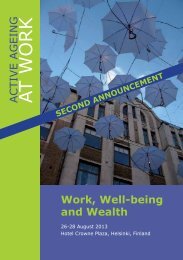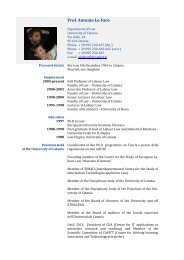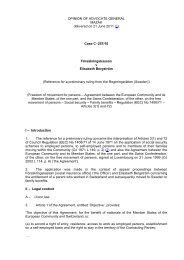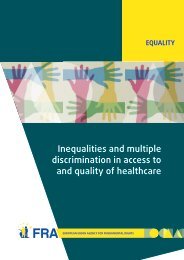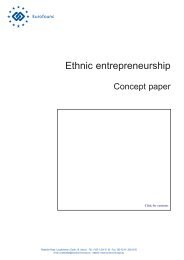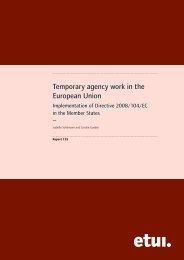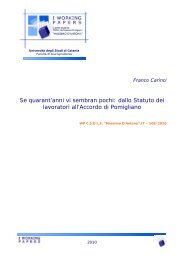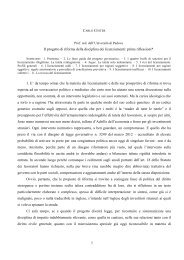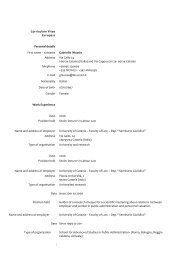Study on non-legislative initiatives for companies to promote gender ...
Study on non-legislative initiatives for companies to promote gender ...
Study on non-legislative initiatives for companies to promote gender ...
Create successful ePaper yourself
Turn your PDF publications into a flip-book with our unique Google optimized e-Paper software.
86 Gender equality <strong>initiatives</strong><br />
In the field of diversity, there are also two prizes which have a focus <strong>on</strong> <strong>gender</strong> related<br />
issues: In the United Kingdom there is the “MX Award <strong>for</strong> Diversity and Inclusi<strong>on</strong><br />
(Manufacturing Excellence Awards)” which specifically focuses <strong>on</strong> <strong>gender</strong> equality in<br />
occupati<strong>on</strong>s where women are currently underrepresented. It includes m<strong>on</strong>i<strong>to</strong>ring<br />
procedures in the field of work-life balance and equality and diversity training. Furthermore,<br />
in Denmark, there is “MIAPRISEN - Mangfoldighed i Arbejdslivet Prisen” (MIA<br />
Award - diversity in the workplace award) which awards <strong>companies</strong> promoting diversity,<br />
including <strong>gender</strong> matters. The prize is co-funded by the PROGRESS programme and is<br />
seen <strong>to</strong> be the most important and recognised award regarding workplaces and quality<br />
of work in Denmark.<br />
2.4 Charters<br />
The commitment <strong>to</strong> <strong>promote</strong> <strong>gender</strong> equality can be shown by signing a charter. The<br />
charter states the comm<strong>on</strong> values of the signed who declare <strong>to</strong> act according <strong>to</strong> the<br />
requirements of and in line with the goals of the charter. Normally, the activities and<br />
progress of the members c<strong>on</strong>cerning the core c<strong>on</strong>cepts of the charter are not assessed<br />
or c<strong>on</strong>trolled by external bodies. It is up <strong>to</strong> each signing organisati<strong>on</strong> in which way it<br />
supports the charter’s aim. In many cases the charters are not signed by enterprises<br />
<strong>on</strong>ly, but involve key stakeholders like ministries, regi<strong>on</strong>al governments, business<br />
organisati<strong>on</strong>s, trade uni<strong>on</strong>s, public employment services, NGOs etc. Apart from general<br />
charters aiming at <strong>gender</strong> equality in working life in general, most of the charters have a<br />
special focus.<br />
The rec<strong>on</strong>ciliati<strong>on</strong> of private and family life is the c<strong>on</strong>cern of the signed enterprises<br />
of the German “Gemeinsame Erklärung Erfolgsfak<strong>to</strong>r Familie” (charter of success fac<strong>to</strong>r<br />
family). The enterprises have <strong>to</strong> be member of the “Network Success Fac<strong>to</strong>r Family”<br />
and declare by signing the charter that a family friendly management is part of their<br />
corporate culture, that they make ef<strong>for</strong>ts <strong>for</strong> a better work-life-balance and that they<br />
<strong>promote</strong> the positive effects of family friendly measures. Launched in 2008, more than<br />
800 enterprises support the initiative up <strong>to</strong> now and are listed <strong>on</strong> the internet.<br />
In France, the “Charte de la Parentalité en Entreprise” (charter <strong>for</strong> parenthood in the<br />
workplace) has been signed by 120 <strong>companies</strong>, public administrati<strong>on</strong>s and n<strong>on</strong>-profit<br />
organisati<strong>on</strong>s with the aim <strong>to</strong> change percepti<strong>on</strong>s and behaviour <strong>to</strong>wards pregnancy<br />
and parenthood in the workplace. By signing the Charter, organisati<strong>on</strong>s make<br />
commitments:<br />
• <strong>to</strong> change percepti<strong>on</strong>s by in<strong>for</strong>ming managers and HR staff <strong>on</strong> parenthood<br />
challenges and by communicating <strong>to</strong>wards employees about the commitment of<br />
the organisati<strong>on</strong>;<br />
• <strong>to</strong> allow work-life balance and ensure adequate working c<strong>on</strong>diti<strong>on</strong>s <strong>to</strong> childbearing<br />
employees;<br />
• <strong>to</strong> ensure the absence of discriminati<strong>on</strong> related <strong>to</strong> career development in HR and<br />
managing practises.<br />
The charter is mainly signed by big <strong>companies</strong>, HR c<strong>on</strong>sultants and <strong>companies</strong> whose<br />
activity is c<strong>on</strong>nected <strong>to</strong> parenthood. Although the charter relies <strong>on</strong> a “self-censorship”<br />
from the signed <strong>companies</strong>, in 2009 the initia<strong>to</strong>rs decided <strong>to</strong> launch a barometer which<br />
is meant <strong>to</strong> be updated every year. Employers are asked about their c<strong>on</strong>crete acti<strong>on</strong>s<br />
taken in favour of work-life balance and employees shall c<strong>on</strong>sider <strong>to</strong> which extent their<br />
needs in terms of work-life balance are met by the <strong>companies</strong>.



